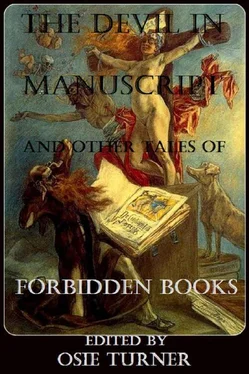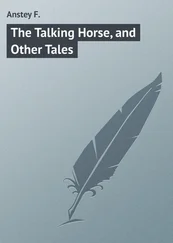It is needless to say that his advice was taken and acted upon. Before six months had passed there were only two copies of “The Confessions of Constantine” in existence—one in Wilbur Huntington’s possession, the other at police headquarters—and manslaughter had once more become a comparatively rare crime.
Indirectly Huntington’s discovery saved Rupert Farrington’s life. It led to a very thorough examination of the prisoners on trial for murder and a suspension of sentence when it was found that they had been mentally unbalanced by Martin’s book. Rupert was transferred to Matteawan for several months where he was under the personal supervision of several eminent brain specialists. Finally he was liberated. He returned home, thoroughly cured of his literary aspirations.
The chief of police got all the glory when the crime wave was broken, but Wilbur Huntington was allowed to keep “The Confessions of Constantine” as a souvenir. The book soon became his evil genius.
“I tell you the man is a menace to society and should be exterminated!”
It was Huntington who spoke. He had been, living with me at the studio for over two weeks while his bungalow on Long Island was being renovated. Wilbur had brought “The Confessions of Constantine” with him. In spite of my protests, he had been reading portions of the condemned book aloud during the last hour and railing at the author between breaths. I did not like his air of unusual excitement and sought to calm him.
“Martin could hardly have guessed that his work would cause so much suffering and crime,” I ventured.
“He couldn’t, eh?” Huntington cried. “Well, I think he could. In fact, I’m sure of it. A genius never underestimates his work. I believe he knew exactly what effect ‘The Confessions of Constantine’ would have on the reading public.”
“Oh, come now, Wilbur! That’s a little bit too much!”
“I believe he planned it!” Huntington continued stubbornly. “Any man who could formulate in his brain such terrible thoughts and who had such a brutally vivid imagination, would delight in the results. Each murder would seem like a new leaf in his crown of victory; they would whisper in his ear that he, alone, was master of his art. I can fairly see him chuckling over the gruesome headlines of the papers, I can fairly hear him saying to himself, ‘This—all this—is my work’!”
He paused for breath. His heightened color and flashing eyes once more indicated an unhealthy excitement entirely foreign to the man. Again I sought to calm him.
“I don’t like Martin any better than you do, Wilbur. But I think you do him an injustice in this. You just alluded to his brutally vivid imagination. Well, the truth is that he has no imagination at all. He clearly told me as much when we were in Paris together. No doubt he gets his themes secondhand, from the riffraff he associates with.”
“No imagination?” Huntington muttered. “No imagination?”
“No, not a grain of it—or so he says. He told me that he had a remarkable memory which served him as well.”
“That’s strange! Then how does he describe so vividly what is taking place in the murderer’s brain? ‘The Confessions of Constantine’ is brimming over with the psychological sensations of the assassin.”
“No doubt he knows many murderers,” I answered. “Possibly they confide in him.”
Huntington threw back his head and laughed. “The sensations of an assassin must be difficult to describe,” he said at length. “The ordinary criminal could not express them. Have you ever been in love, Charley?”
“In a very mild way, perhaps.”
“Well, let me hear you describe the sensations of love.”
I hesitated for a minute. “I don’t believe I can do it,” I said. “At least, not clearly. I felt very happy and that sort of thing.”
“Of course, you can’t describe them. It takes genius to portray vividly any of the great passions. Hate is just as difficult as love. Martin can portray hate. You say he does it without imagination—that means without the knack of climbing into anyone else’s skin. Are you sure that he told you he had no imagination, Charley?”
“Quite sure. I remember distinctly everything he said.”
Wilbur closed his eyes, and, interlacing his pudgy fingers over his paunch, sank back on the lounge. Such an attitude of abandon meant that he was thinking deeply. It was quite characteristic of the man to sink into a kind of coma and then come to the surface again grasping an illusive fact. As I sat watching his recumbent figure, I was prepared for some startling manifestation of uncanny insight.
At last Huntington sat up and rubbed his eyes. “Have you got Martin’s first book about the premises?” he asked.
“‘Many Murders’? Yes. Do you want to see it?”
“Yes, indeed, Charley,” he murmured. “Perhaps we can read between the lines.”
I took “Many Murders” out of the bookcase and handed it to him. He opened it at random and read a portion of “In a Blind Alley” aloud. At length he closed the book and picked up “The Confessions of Constantine.”
“He didn’t have to have imagination to write that story, Charley,” he said. “You shared the adventure with him, I believe?”
“Yes, it was that murder in the alley I told you about. Ho saw it all.”
Huntington nodded and opened “The Confessions of Constantine.” For some time he read silently, moving his lips. He seemed to be weighing each word. Finally he spoke again.
“‘Many Murders’ came out before your brother’s death, didn’t it?” he asked.
“Yes.”
“And ‘The Confessions of Constantine’ about two years after his death?”
“I believe so.”
“Then I have a little theory which, if it stands the acid test of truth, will put Martin liors de combat for good and all. Perhaps the world has little more to fear from him.”
“I’m sure I don’t know what you’re driving at, Wilbur.”
“Have patience, Charley. Listen! I think I hear someone tapping on your door.”
When I flung the door open, I found a freckled messenger boy in the corridor. He had a registered letter for Wilbur, addressed in very small but legible writing—writing which, for some unaccountable reason, seemed familiar. Signing for the letter, I returned to Huntington.
“Here’s a letter for you,” I said, handing him the note. “Whoever addressed this envelope has a confoundedly steady hand. It’s like engraving.”
“You’re an inquisitive cuss!” Huntington murmured. “Perhaps it’s from a lady friend.”
He tore open the envelope and glanced at its contents. The next moment, his eyebrows crawled up his forehead in surprise. “Speaking about the devil!” he cried. “Well, what do you know about this!”
“Nothing. But I’d like to. That handwriting interests me. There’s something familiar about it. Is it from your mother?”
“Not exactly!” Huntington replied. “Just listen to this.” Holding the letter on a level with his eyes, he began to read as follows:
“My Dear Me. Huntington: I understand that you have recently become a literary critic. Allow me to congratulate you on your judgment in regard to my book, ‘The Confessions of Constantine.’ No doubt, as you so wisely pointed out to the police, it was a work which proved rather detrimental to the morals of the reading public. By condemning it, the government paid me the highest tribute which can fall to the lot of any artist—the tribute of taking my mental creations seriously.
I have just finished another book of short stories, and I should like your opinion of it before it goes to press. As you have constituted yourself a moral censor, a Mother Grundy of literature, I feel obliged to be guided by your advice. Will you do me the honor of calling at eight o’clock tonight?
Читать дальше












